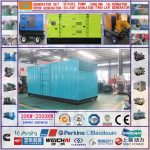Diesel Generators for Transient Loads A Comprehensive Guide

Introduction
Diesel generators have long been a reliable source of backup power for various applications, especially in situations where a stable power supply is critical. One common use case for diesel generators is to power transient loads, which are devices or systems that require a sudden surge of power for a short duration. In this article, we will explore the characteristics of diesel generators that make them suitable for handling transient loads, their benefits and limitations, as well as best practices for optimizing their performance in such scenarios.
Understanding Transient Loads
Before delving into the specifics of diesel generators for transient loads, it is important to first understand what transient loads are and why they present unique challenges for power systems. Transient loads are devices or equipment that require a sudden increase in power consumption for a brief period, typically lasting only a few seconds to a few minutes. Common examples of transient loads include electric motors, compressors, and pumps, which may draw a high starting current to overcome inertia and bring the equipment up to speed.
The challenge with transient loads lies in the fact that they can cause significant fluctuations in power demand, leading to voltage and frequency variations in the electrical system. If not properly managed, these fluctuations can result in voltage sags, frequency deviations, and even power outages, which can be detrimental to sensitive equipment and processes.
Diesel Generators for Transient Loads
Diesel generators are well-suited for handling transient loads due to their inherent design and operating characteristics. Unlike grid-connected power sources, diesel generators operate independently and can respond quickly to changes in load demand. This responsiveness is crucial for transient loads that require an immediate surge of power to start up or operate at peak performance.
Key features of diesel generators that make them ideal for transient loads include:
1. Fast Start-Up Time: Diesel generators can reach their full power output within seconds of being started, making them ideal for providing the initial surge of power required by transient loads.
2. High Power Density: Diesel generators are known for their high power density, meaning they can deliver a large amount of power in a relatively compact size. This makes them suitable for applications with varying load demands, including transient loads.
3. Reliable Operation: Diesel generators are known for their robustness and reliability, making them a dependable source of backup power for critical applications. This reliability is essential for transient loads that cannot afford downtime or interruptions in power supply.
Benefits of Using Diesel Generators for Transient Loads
There are several benefits to using diesel generators for powering transient loads, including:
1. Fast Response Time: Diesel generators can quickly ramp up their power output to meet the sudden increase in demand from transient loads, ensuring smooth operation without disruptions.
2. Independence from Grid Power: Diesel generators operate independently of the grid, providing a reliable source of power even during grid outages or fluctuations. This independence is crucial for critical applications that cannot afford downtime.
3. Scalability: Diesel generators come in a wide range of sizes and power outputs, allowing for scalability to meet the specific requirements of transient loads. Whether powering a small motor or a large industrial compressor, there is a diesel generator size suitable for the task.
4. Fuel Efficiency: Diesel generators are known for their fuel efficiency, especially when operating at partial load. This efficiency can result in cost savings over time, particularly for applications with fluctuating load demands.
Limitations of Using Diesel Generators for Transient Loads
While diesel generators offer numerous advantages for handling transient loads, they also have some limitations that should be taken into consideration:
1. Maintenance Requirements: Diesel generators require regular maintenance to ensure optimal performance and reliability. Neglecting maintenance tasks can lead to breakdowns and reduced lifespan of the generator.
2. Noise and Emissions: Diesel generators can be noisy and produce emissions during operation, which may be a concern in certain environments or applications. 500kw diesel generator for remote development projects and emission control measures may be necessary to mitigate these issues.
3. Initial Cost: Diesel generators can have a higher upfront cost compared to other power sources, which may be a barrier for some users, especially for smaller-scale applications with lower budgets.
Best Practices for Optimizing Diesel Generators for Transient Loads
To maximize the performance and efficiency of diesel generators when powering transient loads, consider the following best practices:
1. Proper Sizing: Select a diesel generator size that matches the peak power demand of the transient load, taking into account the starting current requirements and any future expansion plans.
2. Load Testing: Conduct regular load testing to ensure the diesel generator can handle the transient loads effectively and identify any potential issues before they escalate.
3. Maintenance Schedule: Establish a routine maintenance schedule for the diesel generator, including oil changes, filter replacements, and inspection of critical components. Regular maintenance will help prevent unexpected failures and prolong the generator's lifespan.

4. Fuel Quality: Use high-quality fuel and follow proper storage and handling procedures to ensure the diesel generator operates efficiently and reliably. Contaminated or degraded fuel can lead to performance issues and damage to the generator.
5. Monitoring and Remote Control: Implement monitoring systems and remote control capabilities to track the performance of the diesel generator in real-time and make adjustments as needed. Remote control features can also enable automatic start-up and shutdown sequences based on load demand.
Conclusion
Diesel generators are a reliable and efficient choice for powering transient loads, thanks to their fast response time, scalability, and independence from grid power. By understanding the unique characteristics of transient loads and implementing best practices for optimizing diesel generator performance, users can ensure a stable and uninterrupted power supply for critical applications. Despite some limitations, diesel generators remain a versatile and cost-effective solution for handling transient loads in a wide range of industries and settings.
